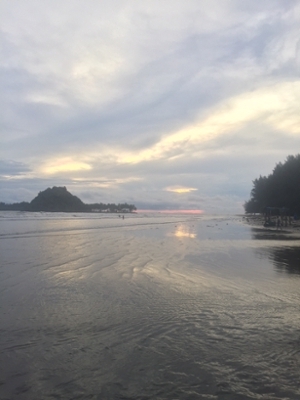One Month
Last week I had the opportunity to travel with PUSaKO to another city in West Sumatra called Sawahlunto. Sawahlunto is known as the oldest colliery site in Southeast Asia, as the Dutch developed the town for its coal in the late 19th century. The town still displays the history of Dutch Colonization, as the old mining site is still intact. Further, the remnants of the train system the Dutch developed to link the coal trade throughout West Sumatra is very prevalent in Sawahlunto. Interestingly, the purpose of our travel to Sawahlunto was on the topic of investment. In Indonesia, the local government laws are called regulations, and in order to pass a regulation the local government must first conduct research and an academic study on the impact of the potential regulation. The Mayor, or Walikota, of Sawahlunto hired PUSaKO to do this research and draft a regulation on increasing outside investment in the city. Sawahlunto is designing this regulation to follow a higher level Presidential regulation on increasing investment in all Indonesian cities and towns. During the proposal PUSaKO presented their initial findings and also requested more data from local government department heads, especially the tourism office. One of the obvious discussion points was the best way to increase investment, with some more interested in using the historic elements of town to increase tourism and others pushing for more modern investment ideas. However, the only real area of disagreement was over the land to be used for any new projects, and who might own the land.
Additionally, I was invited to travel to the town of Solok to visit a naturally occurring hot spring with a group of fellow PUSaKO researchers. Traveling to both Solok and Sawahlunto was at least an hour drive from the coast where Padang sits and into the mountains of West Sumatra. Both the beach and the mountains offer beautiful views, as seen in the pictures below.


Learning the local culture continues to be an adventure. On the way to Sawahlunto I looked out of the window of the car and saw a man walking a baboon down the street on a leash. When I reacted with some excitement, my local friends were quite confused. After I explained that the only place to see a baboon in the United States is at a zoo, they laughed and explained that the local people train the baboons to retrieve coconuts from the trees. Another local custom here is juice from freshly squeezed sugar cane, which is absolutely incredible for someone with a sweet tooth like mine.
In terms of my research, I continue to understand the Indonesian government and electoral system more and more every day. One of the difficulties that I have encountered is that when the lawmaking body of the national government (DPR) passes a law, like Law No. 1 Year 2015, and they amend the law they do not produce a final document. So, when the DPR passed Law No. 8 Year 2015 amending and adding sections to Law No. 1, they only include the sections they make changes to in the most recent law. So, the untouched provisions of Law No. 1 are still active, but there is no current, single document with the most recent version of the law. This gets even more complicated when there is a second amendment to the original law, like Law No. 10 Year 2016. The three laws that I mentioned are the original law, Law No.1, and the two amendments, Law No. 8 and Law No. 10, that govern the elections of regional heads of government. What this means is that when I want to use an article from the law governing an election function, I usually have to check all three documents, instead of the most recent 2016 amendment. If that was confusing, it should be.